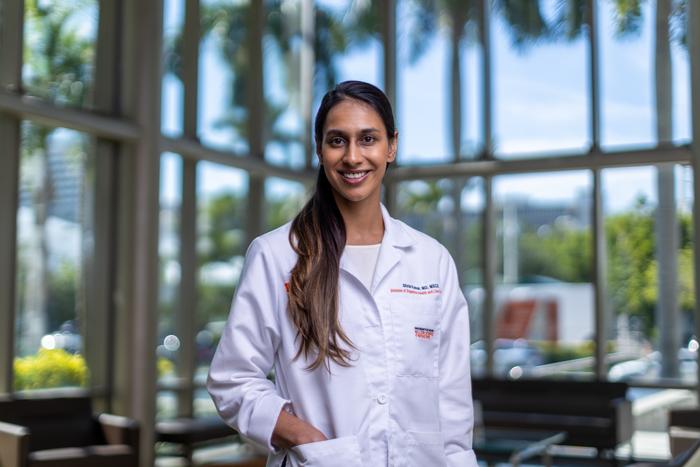MIAMI, FLORIDA (April 3, 2024) – What if we could eliminate a major risk factor for stomach cancer in Black, Asian, Latino and other vulnerable populations? A new study from Sylvester Comprehensive Cancer Center at the University of Miami Miller School of Medicine shows the feasibility of reaching out to high-risk communities with free, accessible testing and treatment for Helicobacter pylori bacterium infection – a major risk factor for gastric cancer.

Credit: Photo by Sylvester
MIAMI, FLORIDA (April 3, 2024) – What if we could eliminate a major risk factor for stomach cancer in Black, Asian, Latino and other vulnerable populations? A new study from Sylvester Comprehensive Cancer Center at the University of Miami Miller School of Medicine shows the feasibility of reaching out to high-risk communities with free, accessible testing and treatment for Helicobacter pylori bacterium infection – a major risk factor for gastric cancer.
Shria Kumar, M.D., a physician-scientist at Sylvester, sees patients with gastric cancer in her South Florida clinical practice, and often is struck by the severity of their illness. Frequently, their stomach cancer has progressed to an advanced stage, where there are fewer – and less effective – treatment options for this potentially deadly disease.
That grim reality led her to wonder if targeting the cancer’s major risk factor, Helicobacter pylori bacterium infection, could make inroads in susceptible communities.
Kumar and her Sylvester colleagues launched a community-based study to test for and treat H.pylori among vulnerable South Florida populations, including Black, Asian and Latino residents. Their findings, published April 3 in Clinical Gastroenterology and Hepatology, indicate that they could identify and eliminate these infections within a community setting, but not for all affected individuals.
“Our results show promise for screening and treating high-risk people in the communities where they live or work,” said Kumar, a member of Sylvester’s Cancer Control Program who served as the study’s lead and corresponding author. “Additionally, our approach could inform future efforts to scale up H. pylori screening throughout Miami and beyond.”
Cancer Link
According to Kumar and study collaborators, including senior author David Goldberg, M.D., and lead research coordinator Damian Cohen, M.D., H. pylori infection is known to cause gut inflammation and increased risk of ulcers. It also is “one of the strongest links to cancer risk known in medicine,” Kumar said.
A previous study conducted by Kumar and colleagues found that patients treated for H. pylori had an almost 75% reduced risk of developing gastric cancer. Their findings aligned with numerous other studies showing that eliminating H. pylori prevents disease development.
Japan and other East Asian countries with a high prevalence of the bacterium routinely screen people for H. pylori infection during their regular doctor visits.
In the U.S., however, where the bacterium is less prevalent, people are only tested for H. pylori when they exhibit common symptoms for infection, including upset stomach, stomach pain or related secondary complications such as ulcers. That approach, Kumar noted, overlooks vulnerable U.S. populations associated with higher incidences of H. pylori, especially Blacks, Asians and Latinos.
Community Outreach
“Miami is the perfect enclave to test community-based strategies to eliminate H. pylori,” Kumar explained. “It’s home to many ethnic and racial minorities who have higher incidences of the bacterium, as well as immigrants from highly affected countries.”
For the study, Kumar and colleagues visited health fairs and community centers, while also deploying Sylvester’s Game Changer Vehicles, which bring cancer screenings and information to underserved communities.
The researchers used portable breath-test machines to screen participants for H. pylori and immediately provided them with free treatment regimens if they tested positive. They were asked to return to a testing site several weeks later to ensure the bacterium had been eliminated.
Overall, the Sylvester team tested 155 people and found that about one-third – 52 – were H. pylori-positive. They were given a drug combination to treat the bacterium. Of those, 23 people returned to a site for retesting after treatment, and all but one had eliminated their infections.
Moving Forward
The study’s approach produced mixed results. “It highlighted the potential for community-based H. pylori screening and treatment while also identifying potential pitfalls,” Kumar said. “Many people were still left behind.”
Ten people did not complete treatment, she noted, and the research team lost contact with 19 others.
Potential barriers to greater participation and success with this ongoing study include the need for retesting over time and the complexity of treatment, which requires taking pills several times a day, Kumar explained. The researchers hope to find ways to improve treatment compliance and reduce patient burden.
Study co-author Goldberg remains hopeful that H. pylori testing will become a routine U.S. screening with advancements that simplify testing and treatment. “These things tend to evolve over time with new technology and knowledge.”
# # #
ARTICLE TITLE: Barriers to Community-Based Eradication of Helicobacter pylori Infection
Authors: The complete list of authors is included with the article.
Funding: The study was supported by the Southeast Collaborative for Innovative and Equitable Solutions to Chronic Disease Disparities, National Institute of Minority Health and Health Disparities (P50MD017347) and Sylvester Comprehensive Cancer Center (5P30CA240139).
Disclosures: The authors reported no disclosures or potential conflicts.
Read more on the InventUM blog and follow @SylvesterCancer on X to learn more about its research and care.
# # #
Journal
Clinical Gastroenterology and Hepatology
Article Title
Barriers to Community-Based Eradication of Helicobacter pylori Infection
Article Publication Date
3-Apr-2024
COI Statement
The authors reported no disclosures or potential conflicts.



